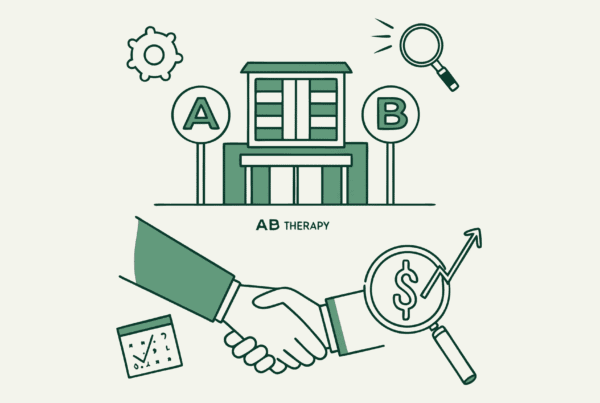An inside look at the market, valuation, and process for owners of Telehealth & Digital Therapy Solutions practices.
The market for telehealth in West Virginia is evolving quickly, creating unique opportunities for practice owners. If you are considering the future of your Telehealth or Digital Therapy Solutions practice, this guide offers a clear-eyed view of the landscape. We will cover market conditions, key valuation drivers, and the sale process, helping you understand your options and make informed decisions for your legacy and financial future.
Market Overview
Telehealth is no longer a niche service in West Virginia. It has become a core component of the state’s healthcare fabric. For practice owners, this creates a strong foundation for a potential sale. The current environment is shaped by a few key factors.
- High Adoption: West Virginia has embraced telehealth, with a hospital adoption rate exceeding 90%. This widespread acceptance means buyers are actively seeking established telehealth platforms.
- Rural Necessity: In a state with significant rural populations, your practice serves as a critical lifeline. You provide access to care that is otherwise difficult to obtain, a value proposition that sophisticated buyers understand and prize.
- Embedded Workflows: Since the pandemic, telehealth is not just an add-on. It is a fully integrated and expected part of modern medical care, from chronic disease management to digital therapy.
Key Considerations
While the market is strong, a successful sale depends on navigating West Virginia’s specific landscape. Buyers will look closely at your operational and regulatory standing. Your practice must have a firm grasp of state telehealth laws, including the rules outlined in W. Va. Code R. a7 11-15-3. This is not just about checking a box. It is about demonstrating a low-risk, high-value operation.
Another key area is reimbursement. West Virginia has parity laws, meaning insurers cannot deny payment just because a service was delivered via telehealth. However, demonstrating consistent and successful collections from various payers, including West Virginia Medicaid, is a major factor in your practice’s valuation. Clean records and a proven compliance program transform potential liabilities into strong selling points, showing a buyer they can step into a seamless operation.
Market Activity
You may not see telehealth practices listed for sale on public websites, but the transaction market is active behind the scenes. Understanding who is buying and why is key to positioning your practice.
Buyer Appetite
There is a growing interest from both strategic acquirers (like larger healthcare systems) and private equity groups. They are looking for established telehealth practices in West Virginia to gain a foothold in a market defined by its unique access challenges. They see your established patient base and operational workflows as a valuable, turn-key asset.
The Timing Question
Many owners tell us they plan to sell in “2 or 3 years.” That is exactly when a conversation should start. Buyers pay for proven performance, not just future potential. Preparing your financials, compliance, and growth story now ensures you can sell on your terms and timeline, not theirs. It maximizes your value when you are ready to exit.
Sale Process
Selling a practice is not a single event. It is a structured process that unfolds over several months. It generally begins with deep preparation, where we help you organize your financials and operations to present them in the best possible light. Next comes a formal valuation to establish a credible asking price based on data, not guesswork. From there, we confidentially market your practice to a curated list of qualified buyers, generating interest while protecting your identity. The final stages involve negotiating offers, navigating the detailed buyer due-diligence process, and finalizing the legal paperwork. Each step requires careful management to protect your interests and maximize the final outcome.
Valuation
One of the first questions any owner asks is, “What is my practice worth?” The answer is more than just a multiple of revenue. Sophisticated buyers look at Adjusted EBITDAi a measure of your practice’s true, ongoing profitability. We calculate this by taking your net income and adding back interest, taxes, depreciation, and one-time or owner-specific costs. This gives a clear picture of the cash flow a new owner can expect.
That number is then multiplied by a valuation multiple. For telehealth practices, this multiple is influenced by several key factors.
| Valuation Factor | Why It Matters to a Buyer |
|---|---|
| Technology Stack | Is your platform secure, compliant, and efficient? |
| Provider Reliance | Is the practice dependent on one owner, or is it a multi-provider model? |
| Patient Demographics | Do you have a loyal, established patient base with recurring needs? |
| Payer Mix | Is revenue stable and diversified across different insurance and private payers? |
Many owners undervalue their own business. A proper valuation tells the compelling story of your practice in the language that buyers understand and are willing to pay for.
Post-Sale Considerations
The work isn’t over once the sale documents are signed. The structure of the deal has major implications for your future. A well-designed transition plan is needed to ensure a smooth handover for your patients and staff, protecting the legacy you’ve built. Equally important are the tax consequences. How the sale is structured can significantly change your net, after-tax proceeds. Planning for this from the beginning is one of the most effective ways to maximize the financial return from your years of hard work. Thinking about these post-sale elements before you even go to market is the mark of a well-advised seller.
Frequently Asked Questions
What is the current market environment for selling a Telehealth practice in West Virginia?
The telehealth market in West Virginia is rapidly evolving and strongly adopted, with over 90% hospital adoption and embedded workflows making telehealth a core component of healthcare. This creates a solid foundation and high buyer interest for selling a telehealth or digital therapy practice.
What legal and regulatory factors should I be aware of when selling my telehealth practice in West Virginia?
Buyers will scrutinize your compliance with West Virginia’s telehealth laws, particularly W. Va. Code R. 7 11-15-3. Demonstrating a low-risk operation with strong compliance and regulatory adherence is crucial to attract buyers and ensure a smooth sale.
How does reimbursement impact the valuation of my Telehealth practice?
West Virginia has parity laws requiring insurers to reimburse telehealth services equally. Showing consistent, successful collections from various payers, including Medicaid, is vital. Clean reimbursement records and compliance enhance your practice’s valuation by minimizing liabilities and proving financial stability.
Who are the typical buyers interested in West Virginia telehealth practices?
Both strategic acquirers such as larger healthcare systems and private equity groups are actively seeking established telehealth practices in West Virginia. They value platforms with a loyal patient base, operational workflows, and the ability to address rural healthcare access challenges.
What is the typical sale process for a West Virginia Telehealth practice?
The sale process spans several months, starting with preparing your financials and operations, followed by a formal valuation. Then marketing your practice confidentially to qualified buyers, negotiating offers, due-diligence, and finalizing legal paperwork. A well-managed process protects your interests and maximizes sale value.



